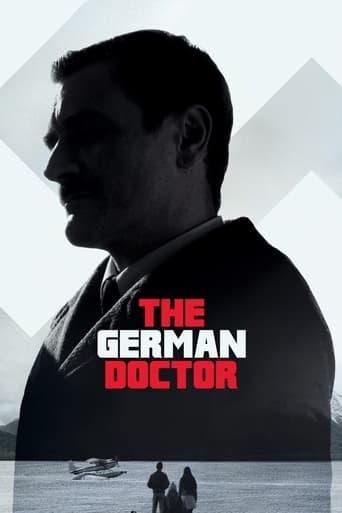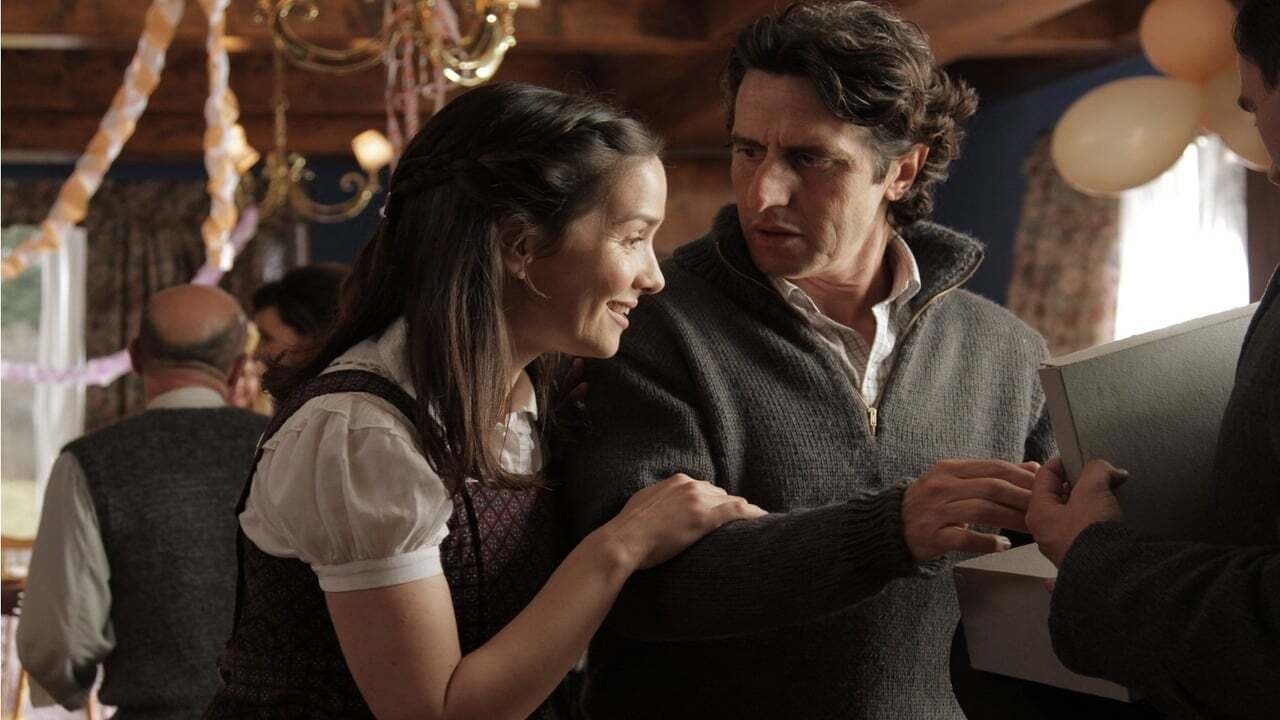l_rawjalaurence
Filmed in the rolling landscapes of Patagonia, Argentina, WAKOLDA is a truly harrowing story of the Nazi doctor who continued to practice his experiments well after the Second World War had ended.In exile and among a group of Nazi sympathizers, Josef Mengele (Àlex Brendemühl) lives under an assumed name, and ingratiates himself with a family running a hotel. Befriending the young daughter Lilith (Florencia Bado) he claims to be able to increase her growth and thereby prevent her from being teased at school for being the smallest in the class. She readily agrees; as do her parents. This provides the pretext for Mengele to continue his macabre researches that actually do more harm than good.Lucía Puenzo's film contrasts the domestic world of Lilith with the world of the Nazi sympathizers congregating in a local German school. They still practice the salute, and forge a regimented atmosphere guaranteed to impose order on the unwilling learners. Lilith is sent to the school, in the hope of receiving a good education - although remaining largely unaffected by Nazi ideology, she is made painfully aware of her lack of height, which only encourages her to seek Mengele's help even more.Set in 1960, WAKOLDA draws a direct parallel between Mengele's work and the doll-manufacturing practiced by Lilith's father Enzo (Diego Peretti). At first Enzo makes all the toys himself; but with Mengele's investment the venture is transformed into a small cottage industry, where all the dolls' faces are identical and they are given tiny mechanized beating hearts. We are made painfully aware that Mengele treats humanity with just the same indifference as the factory workers treat their dolls - as material for experimentation rather than living breathing personae.The film maintains a cool, detached tone throughout; although Israeli agents pursue Mengele with the same enthusiasm as with other ex- Nazis (notably Adolf Eichmann), they fail to capture him. But this is not really the film's concern: director Puenzo is far more concerned with Mengele's terrible plausibility as a practicing doctor taking unwitting victims into his confidence and subsequently abusing them.
s3276169
The German Doctor is, simply put, excellent. It follows the latter life of notorious Nazi doctor and war criminal Joseph Mengele who lives under an alias in 1960's Argentina. The material is inherently interesting. Mengele was a proponent of Eugenics, the development of a genetic breed of blond, blue eyed super humans cast in the Nazi Aryan mould. There is some evidence to suggest Mengele quietly continued his medical experimentation upon arriving in Argentina. This film taps into that premise with Mengele taking a scientific interest in an Argentinian family of German descent. Its a thriller with Mengele quietly experimenting on the family. There's a dynamic of growing tension with those supporting Mengele, including elements within the family and those opposed to his actions. Don't expect lots of over the top thrills and spills in this film. Its subtle with very clever twists and turns. Its about psychological manipulation as much as it is about medical experimentation and the ethics or in this case lack of ethics shown by its proponents. This film also offers up a very dark insight into ingrained bigotry and a warped view of what it means to be human. Are we, like dolls, to be produced en masse in more or less identical form?The acting is absolutely top notch. Mengele is played with cold, self assured ease by Spanish actor, Àlex Brendemühl. The remaining cast, including Florencia Bado, who plays a young girl, who is, at the heart of Mengeles interest in the family, offers up an equally impressive performance. This is a truly exceptional thriller that you should see. It has subtitles but everything from the acting, story, settings and directing is executed with such polish this is no real impediment. Ten out of ten from me.
Turfseer
"The German Doctor" is Lucía Puenzo's take on what Nazi war criminal Josef Mengele (aka "The Angel of Death") might have been doing while he was on the run in Argentina in the early 60s. Puenzo has fashioned her story based on her own 2011 novel, "Wakolda." Since Mengele is revealed to be Puenzo's protagonist from the get go, the film offers little in terms of suspense. Nonetheless, "The German Doctor" is worthwhile in other respects and Puenzo manages to convey a believable tale despite its fictional underpinnings.Puenzo's framing device is a coming of age story focusing on 12 year old Lillith, who has arrived in 1960 with her Argentinian father, Enzo, German-speaking mother, Eva (descended from German immigrants who came to Argentina years before), and brothers Tomas and Polo, to the town of Bariloche, a German enclave in the Patagonian region of Argentina. Enzo and Eva are re-opening a family held inn and their first paying guest is Helmut Gregor, a creepy doctor who actually is Josef Mengele, responsible for ghastly crimes against humanity while he was head doctor at Auschwitz during World War II.Lillith, a victim of stunted physical development, is unmercifully mocked by fellow students at the German speaking school she attends. In steps Gregor who offers Eva assistance in helping to advance Lillith's maturation by administering growth hormone injections. As a descendant of ethnic Germans, Eva trusts Gregor instinctively and perhaps is symbolic of the Nazi sympathizers during the Third Reich, whom were seduced by promises of national victory via theories of racial superiority. In order to help her daughter, Eva is willing to betray her husband, who is dead set against the idea of hormone injections that, in his opinion, are against nature.Not only is Eva seduced, but later Gregor seduces Enzo, by offering to mass produce his special children's porcelain doll design. Enzo perhaps represents the "Good Germans" who were opposed to Nazi theories of racial superiority but were taken in by the quest for material advancement.Puenzo also does well in reminding us that individuals such as Mengele could not have thrived without the support of the community who gave comfort to him. Gregor aka Mengele received money from ex-Nazis and Nazi sympathizers which was passed on to him by members of the ethnic German community in Argentina. The violence underneath the surface is perhaps best illustrated by the brutal beating of one of the children at the German speaking school by a coterie of latter day descendants of the Hitler Youth.When Mengele was at Auschwitz, his obsession with twins, would often lead him to conduct barbaric experiments (such as surgically attaching twins together to observe their behavior). Here too he appears to be taking an unhealthy interest in Eva, who is now about to give birth to a set of twins herself. But when Enzo learns of Gregor's administration of hormone treatments on Lillith, he orders the bad doctor off the premises immediately.In a twist, Eva gives birth to twins who are premature and Enzo has no choice to allow Gregor to assist in helping the twins hours after their birth. Puenzo makes things uncomfortable for everyone by suggesting that evil (in the shape of monster Mengele) has a human face (Gregor), who can harbor ordinary benevolent feelings alongside the monstrous (Gregor's treatment involves prescribing different doses of milk for each infant).In the end, it hardly matters whether this Mengele is real or a fake. Puenzo's makes the good point that seemingly normal people, irrespective of a past positive ethical history, can be easily seduced by evil, when it suits their interests.
maurice yacowar
The original title of The German Doctor (and its source novel) is Wakolda. That's the name of little Lillith's (Florencia Bado) favourite doll, with a hole where its heart should be. When she drops the doll it's picked up and returned by the mysterious stranger, who turns out to be the sadistic Nazi scientist Dr. Josef Mengele (Alex Brendemuhl), operating under an assumed name. From that moment Mengele insinuates himself into Lillith's life and on into her parents'. The undersized girl and the empty doll attract Mengele's suspect interest, ostensibly out of compassion but really under cold detachment.The doll image is central. Lillith's father Enzo (Diego Peretti) is a meticulous one-of-a- kind doll maker who eventually gives Wakolda a mechanical heart. He also gives Lillith and her two brothers — via mother Eva (Natalia Orero), true — new sibling twins. Over Enzo's objections Eva lets Mengele treat Lillith's stunted growth and she takes his pregnancy prescriptions. At the twins' struggling birth Enzo is torn between wanting to banish the dangerous doctor and needing him to save them. In the end, after Mengele escapes the Mossad to Uraguay, he has branded the twins. One is normal, "the control"; the other struggles in Mengele's heartless experiment. When Mengele finances the mass production of Enzo's beautiful dolls he has several motives. One is to ingratiate himself yet further in the household, so he can continue his furtive and open measurements and experiments. His given excuse is "I love beauty." But he is fascinated by "the harmony of imperfections." The racks of porcelain dolls are more ominous than beautiful. They suggest an army of Aryan uniformity. In the piles of doll parts about to be assembled we are reminded of the images of concentration camp corpses. Both are Mengele's factories.Like any film set in some "then" the implicit pertinence is the "now." In 1960 Patagonia the German school remains passionately Nazi. When classmates beat up Lillith's friend for uncovering a buried cache of Nazi materials, the victim boy is expelled for belligerence. Lillith, born premature, is bullied and tormented for being short for her age. The archivist and photographer Nora (Elena Roger), an undercover agent who calls Mossad to arrest Mengele, is reported found dead in the snow the day after his escape. The film points ahead to both Argentina's Dirty War and the contemporary resurgence of anti-Semitism not just in Europe but on North American campuses. And of course, Mengele is only rumoured to have died by drowning. Wherever science proceeds blinded to humanity by a heartless curiosity the spirit of the Angel of Death survives. Those supermen who styled themselves Sonnenman, sun folk, were rather demons of the dark. For medicine, science, any branch of human learning, is like our last sense of those twins: possibly healthy, possibly deadly. The question always is: does the favourite have a heart? For more see www.yacowar.blogspot.com.



 AD
AD



